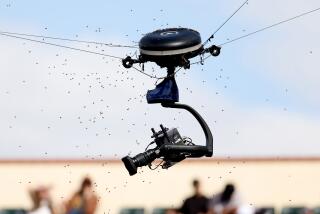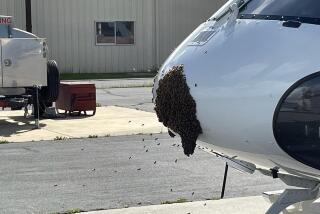Rooftop Workers Have Opera World Abuzz in Paris
- Share via
--The famed Paris Opera House is a beehive of activity in more ways than one. While mezzo-sopranos and tenors sing inside, more than 10,000 worker bees create gallons of honey on the roof. Jean Pocton, the Opera’s beekeeper and manager of its employee cafeteria, has raised bees above the heads of opera lovers for six years. The urban bees, which have to contend with polluted air and hungry Parisian pigeons, seem to do as well or better than the bees Pocton keeps in the country. “They like opera,” Pocton said. “The proof is they reproduce well. . . . On average I harvest more honey in Paris than in the Creuse (in central France),” he said. Pocton said he gives the honey to the opera director, who in turn distributes it to French companies as gifts. The tall honey pots bear labels that say, “Harvested on the roof of the Paris Opera, 1987.”
--One of the “10 Most Inspiring People” selected by the Millennium Society isn’t a person. It’s the U.S. Constitution. The people on the list are Pope John Paul II, actress and AIDS fund-raiser Elizabeth Taylor, Nobel Peace Prize winner and Costa Rican President Oscar Arias Sanchez; singer Paul Simon; basketball legend Julius Erving; oceanographer Jacques Cousteau; Harlem charity worker Mother Hale; Canadian Rick Hansen, who circled the globe in a wheelchair to raise funds for the disabled, and Jessica McClure, the toddler rescued from a Texas well. The society, which was formed in 1979 by Yale students and has grown into a worldwide network of nearly 5,000 members, sponsors scholarships for students committed to peace.
--Three American veterinarians earned $30,000 for one house call. The United Arab Emirates’ embassy in Washington contacted Washington State University veterinarians Karl White and Barrie Grant and Emil Dolensek, chief veterinarian of New York’s Bronx Zoo, about a $4.5-million racing camel owned by Sheik Hamdan ibn Zayad al Nuhayan. The camel, Airplane, which had not lost a race in five years, was sidelined by injured knee ligaments. The Americans decided that the injuries would prevent the camel from racing again. White said Airplane’s knee may heal without surgery. But if not, the nation’s lack of facilities and U.S. restrictions on camel imports could pose a problem. “You can’t do orthopedic surgery in the middle of the desert,” Grant said.
More to Read
The biggest entertainment stories
Get our big stories about Hollywood, film, television, music, arts, culture and more right in your inbox as soon as they publish.
You may occasionally receive promotional content from the Los Angeles Times.










